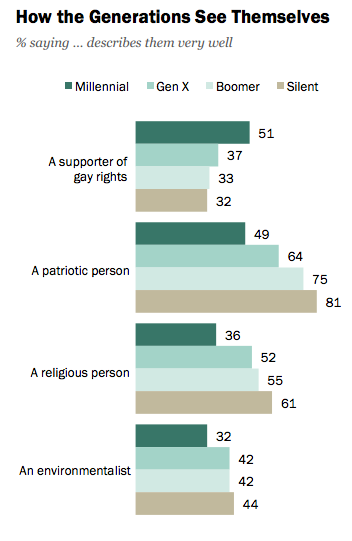Study Shows That Millennials Are Confused About, Well, Everything

The Article: Study: Millennials Deeply Confused About Their Politics, Finances, and Culture by Derek Thompson in The Atlantic.
The Text: Millennials—or Generation Y, which, by varying definitions, includes you if you’re somewhere between 14-34—are the subject of constant obsession and worrying from the managers trying to hire them, the marketers trying to sell to them, and the parents and grandparents trying desperately to get them to call once in a while using the “phone” feature on their smartphones.
So what can we possibly learn that’s new from Pew’s massive survey released this morning? Many things, actually—and mostly contradictions. Which is about right when you’re trying to sum up 85+ million people in a handful of adjectives.
This generation is getting totally screwed by the economy … but we’re the most optimistic generation in the country.
Another report that came out this morning, from the Bureau of Labor Statistics, found that unemployment rate for young people is still elevated: 13.5 percent for people between 15 and 24 and 12 percent between ages 20 to 24. Just awful. So how come young people are so stubbornly optimistic? About their finances of all things?
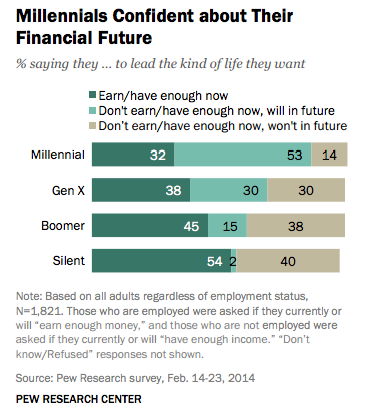
One good explanation is that they’re young. Gen-Xers were just as sanguine about their future portfolios at this age, and many of them were stung by the nearly-as-bad 1980s recession.
This is the most technologically connected generation in modern history … but also the least trusting.
This just barely makes any sense. Here is a generation that trusts peers enough to meet random strangers in bars on Tinder, ride in cars with strangers on Uber X and Lyft, visit strangers’ apartments through Craigslist, sleep on their beds through Airbnb, and we’re also the least likely to say “most people can be trusted”? Put your theories in the comment section; I don’t know what to believe anymore.

This generation has record numbers of single parents … but it also has the most negative attitudes toward single parents.
The American institution of marriage is changing as more women go to school and out-earn their partners, and as couples get married later or don’t get married at all. Millennials have historically high numbers of out-of-wedlock births: 47 percent of newborns to Gen-Y women came outside of marriage, more than double the rate for older adults. But even though Millennials are twice as likely to be single parents, they’re just as likely to disapprove of single parenthood. One possible explanation is that, as Richard Reeves wrote in The Atlantic, young married couples are just as conservative on the institution of marriage and child-rearing as generations before them. They’re just rarer, since more of their peers aren’t getting hitched.

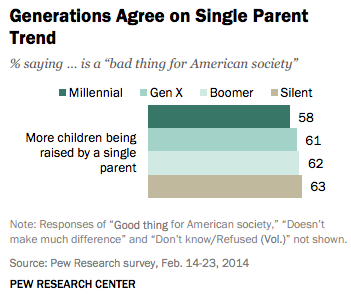
Millennials are famously “the most diverse generation ever” … but we don’t even deserve the label.
About 43 percent of Millennials are non-white, higher than any American generation on record. But since the slim majority of newborns in America are non-white too, it’s much more fair to say that Millennials are the most diverse generation of adults. We’re only the most diverse generation in the country if you decide not to consider people under 14 a generation.
This is the most educated generation ever … and the deepest in student loan debt.
This one isn’t a contradiction so much as a qualifier—a reminder that this generation’s achievements have already come at a cost. One third of Millennials over 25 have a four-year college degree or better, which makes us the best-educated group in the history of the country. It’s a proud superlative to hold, since education tends to correlate with (if not lead to) all sorts of things like happier marriages, more fulfilling jobs, better earnings, and a better life for our children. This superlative, however, comes a price. “Two-thirds of recent bachelor’s degree recipients have outstanding student loans,” Pew reports, with an average debt of about $27,000 and median debt of about $13,000.
The U.S. economy has never been bigger … but it’s never been harder to live better than our parents did.
This from Pew is a whopper: Millennials are the first generation “in the modern era to have higher levels of student loan debt, poverty and unemployment, and lower levels of wealth and personal income than their two immediate predecessor generations (Gen Xers and Boomers) had at the same stage of their life cycles.” In other words, the American Dream as defined as “living better than our parents did” is harder than ever to obtain for the generation at large. But reality isn’t so even. Cast your eye across the country, and you’ll see pockets where upward mobility is higher than anywhere in the world, but also areas where it’s practically impossible for low-income kids to get ahead. This graph, from a recent Harvard paper on intergenerational mobility, gives a rough look at where it’s easier to move ahead relative to your folks (lighter colors) and where it’s harder (darker hues):
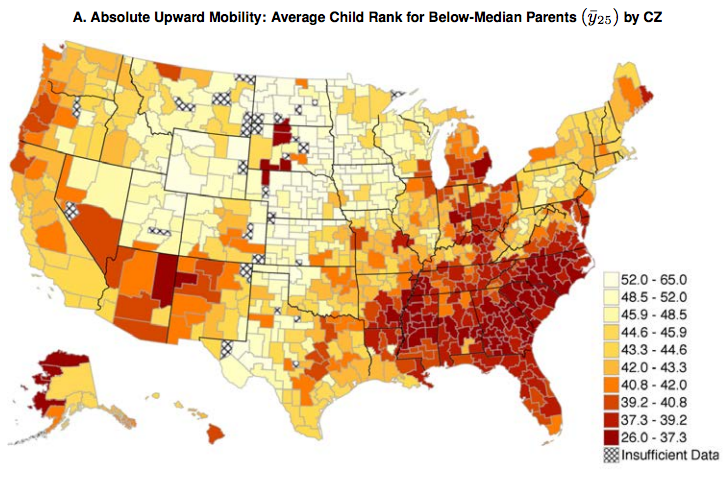
Millennials are less likely to self-identify as Republicans or Democrats … but they also have the highest approval rating of Congress.
Generation Y firmly rejects both parties. They are the least likely group to identify as either Democrat or Republican in the entire country. But they also have the highest approval rating of Congress, at 30 percent. Thirty percent! Even Congress wouldn’t give itself a 30 percent approval rating. Two reasonable theories: (1) Young people just aren’t paying attention enough to know how horrible Congress is; (2) young people are dumbly optimistic about everything, and that includes Washington.

Millennials are much more liberal on gay marriage, pot, and immigration … but no more liberal on abortion or gun control.
The idea that young people are a monolith of social liberalism is complicated by the fact that we’re perfectly representative of older generations’ attitudes on abortion and gun control. That said, we are the most supportive of same-sex marriage, the legalization of marijuana, and a path to citizenship for undocumented immigrants in the U.S. by a wide margin.
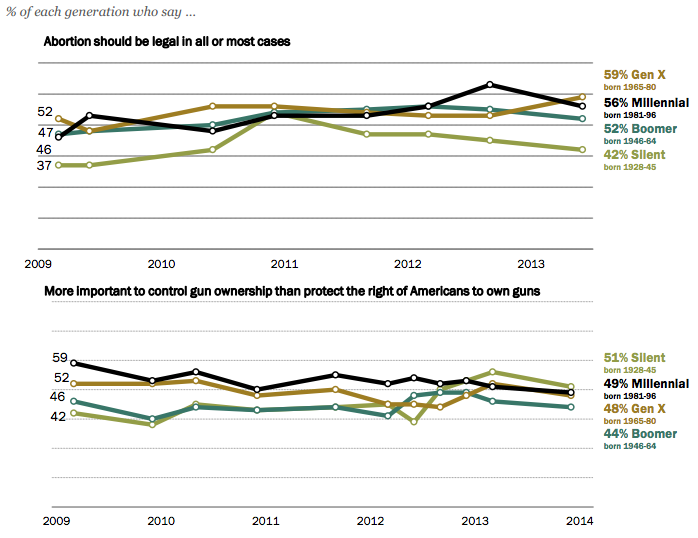
Most Millennials (like all generations) oppose benefit cuts to Social Security … but young people also don’t think there will be any money left in Social Security when they graduate.
Gen-Y’s unbridled optimism about the future of our finances doesn’t quite include the future of the nation’s finances. Half of us think Social Security will be entirely bankrupt by the time we retire (which is supremely unlikely) even though a clearly majority of Millennials (61 percent) oppose benefit cuts in any way to preserve the program.
Millennials voted overwhelmingly for Obama, want universal health care, and are fine with a bigger government … but they oppose Obamacare just like everybody else.
It’s funny that young people are the least likely to identify as Democrats or Republicans since our voting record in presidential elections leans more Democratic than any group since 1972.
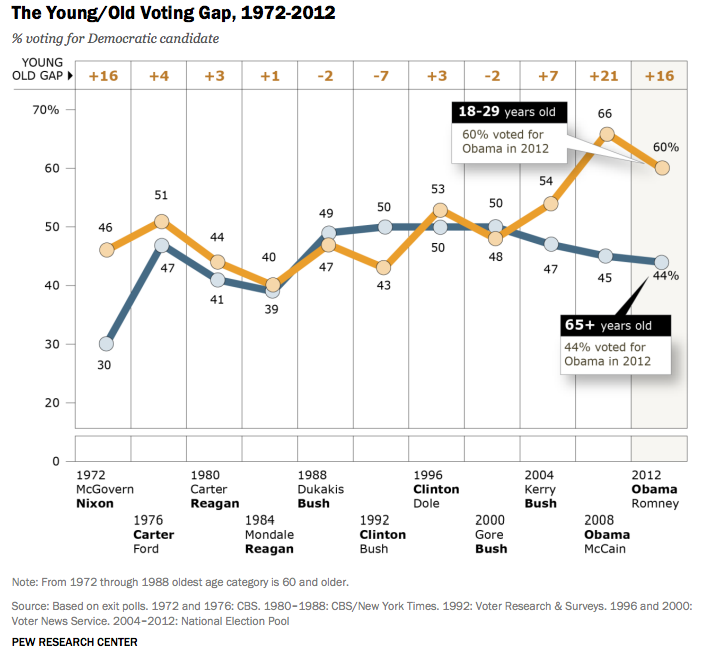
But even though Gen-Y started off in the tank for Obama; and even though they support universal insurance by the widest margin of any group (54-44 percent); and even though they’re most supportive of big government, Millennials’ view of the Affordable Care Act (a.k.a.: Obamacare) is just as negative as the rest of the country. Yes, even though it keeps them on their parents’ insurance plan until 27.

“They care deeply about the environment” … except that they really don’t.
I don’t know where the idea that Millennials care about the environment came from—maybe it’s that they grew up at a time that the entire country started talking more about hybrid cars and climate-change superstorms?—but it’s a myth. Millennials don’t give a hoot about the environment. They’re less likely to consider themselves environmentalists than any other generation, including older senior citizens, even though young people have the most to lose in a world that’s slowly baking.
